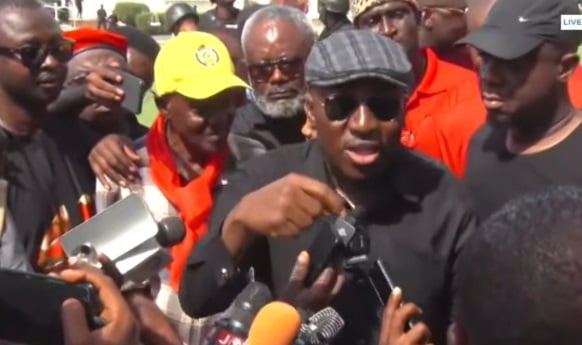The Gallant Cadres of the National Democratic Congress (NDC) have publicly questioned the mental stability of Minority Leader, Hon. Alexander Afenyo-Markin, following his conduct during a recent “Save the Judiciary” demonstration. The Cadres’ statement, released on May 6, 2025, suggests that Afenyo-Markin requires psychological evaluation rather than arrest, in response to a police request for his release for questioning regarding an alleged altercation with a police officer. The incident, captured on video, depicts a confrontation between Afenyo-Markin and the officer, prompting a police investigation. Afenyo-Markin, however, filed a petition claiming he was the victim of an unprovoked assault, further fueling the controversy. The NDC Cadres highlighted this incident, along with what they perceive as other attention-seeking behaviors, as cause for concern regarding the Minority Leader’s mental well-being.
The “Save the Judiciary” demonstration, organized to protest the suspension of Chief Justice Gertrude Torkornoo, became the backdrop for this unfolding drama. The NDC Cadres’ statement emphasized the contrast between the allegedly disruptive actions of Afenyo-Markin and the peaceful nature of the protest itself, which they credit to the democratic principles upheld by the John Dramani Mahama administration. They praised Mahama’s commitment to freedom of expression and assembly, portraying the government’s facilitation of the protest as evidence of their dedication to democratic ideals. This narrative frames the incident as a clash between the Mahama government’s commitment to peaceful protest and the opposition’s alleged disregard for these principles.
The Cadres’ statement further alleges a pattern of attention-seeking behavior from Afenyo-Markin, citing instances from ministerial vetting to press conferences. They characterize him as “pompous” and exhibiting “arrogance,” linking this behavior to a broader trend within the “Corrupt, arrogant Akuffo Addo and Bawumia Government.” This connection attempts to paint Afenyo-Markin’s actions not as isolated incidents, but as symptomatic of a larger problem within the opposition party. The statement uses strong language to condemn Afenyo-Markin’s conduct, raising questions about his motivations and suggesting a need for professional assessment.
The core of the Cadres’ argument rests on their interpretation of Afenyo-Markin’s actions as indicative of a deeper psychological issue. They explicitly call for a “psyche and attention deficit assessment,” suggesting that his behavior goes beyond mere political posturing. By framing the issue in this manner, they shift the focus from the specific incident with the police officer to Afenyo-Markin’s overall mental state. This tactic aims to discredit him not only in relation to this specific event but also in a broader sense, potentially impacting his credibility and political standing.
The Cadres’ statement strategically contrasts Afenyo-Markin’s alleged behavior with the peaceful nature of the protest and the Mahama administration’s purported commitment to democratic principles. They present Mahama as a champion of freedom of expression and assembly, positioning the incident as a stark illustration of the difference between the ruling party and the opposition. This narrative serves to bolster the image of the NDC and Mahama while simultaneously undermining the credibility of Afenyo-Markin and the opposition party.
In essence, the Gallant Cadres’ statement serves as a political maneuver, leveraging the incident at the “Save the Judiciary” demonstration to launch a broader attack on Afenyo-Markin’s character and mental well-being. By calling for psychological evaluation rather than arrest, they aim to cast doubt on his fitness for office and paint him as unstable and attention-seeking. This strategy serves to deflect attention from the specifics of the alleged altercation with the police officer and instead frames the issue as a matter of Afenyo-Markin’s overall suitability for leadership. The statement concludes with a resounding endorsement of Mahama, further reinforcing the narrative of his strong leadership and commitment to democratic ideals.














